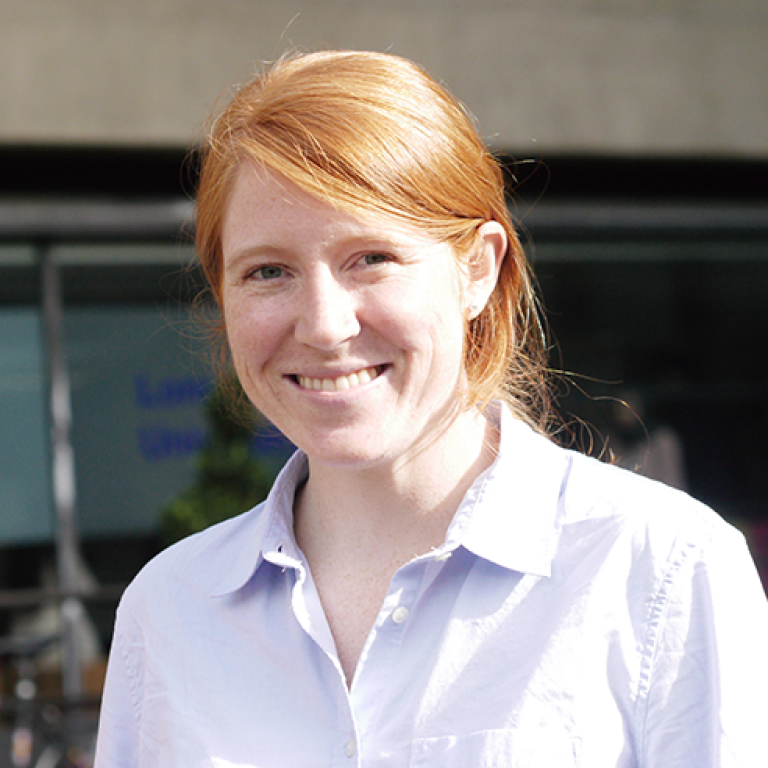7 questions with Lauren Clark
24 October 2017
This week, we meet Lauren Clark, a student from the United States and a UCL ChangeMaker, who has developed a PhD mentoring programme in the UCL Institute of Education alongside completing her own PhD in Critical Pedagogy in Higher Education.

1. Why are you interested in this subject and what do you plan to do in the future?
I became interested in Critical Pedagogy in Higher Education after I was accepted to do my PhD here. I was going to do something slightly different, but the more I read about Higher Education in the UK, the more interested I became in the marketization of Higher Education - where we pay to go to University - which is something that's happened more recently here than in the US (Higher education here was free until the mid-nineties so there's a totally different mind-set towards education).
I was really interested in that and how I could use critical pedagogy to critique what's going on in universities right now and how they could use a different way of teaching to change the way students perceive education - not so much in an instrumental way of 'I need this to get a degree, to get a job' but in a more holistic approach to self development.
I'd like to stay in academia to do teaching and research. I've already started to supervise Masters' students here and next term I'll start doing some teaching, which I'm really excited about.
2. What is the most interesting thing you've done, seen or got involved with while at UCL?
UCL ChangeMakers was a really interesting experience and I'm really glad I did it, as it opened doors to many other opportunities at UCL. It all started when I did the Teaching Associates Programme for Postgraduate Tutors - I became aware of ChangeMakers through one of the training sessions I attended and I put forward a proposal to develop a peer-mentoring scheme which got accepted.
Doing a PhD can be very isolating, as you're conducting your own research and not really going to classes. This is particularly hard for international students who may not have any contacts here or speak the language well. My project partner Zach and I realized that there was a gap in provision for these students so I came up with the idea of starting a mentor programme for students starting at the Centre for Doctoral Education here at the IOE.
With support, advice, training and funding from UCL ChangeMakers, we conducted some research and recruited several PhD students (usually in their second or third years) who would run group mentoring sessions for first years.
The feedback and data we collected was really positive so the department has picked it up and is embedding it into the research training programme. We're now working on how to make it part of the programme whilst ensuring it is owned and run by students, for students.
In the next phase we want to focus on how to reach distance learners, there are a lot at the IOE so we're looking into how we can get them involved in, and benefiting from, the mentoring scheme.
3. Would you recommend UCL ChangeMakers to other students?
Absolutely! It takes a lot more time than you think it will but it's also really rewarding when you see lasting change happening as a result of your hard work!
I found it incredibly rewarding to be able to help so many of my fellow students. I also developed great relationships with mentors and staff. It's also helped a lot with my inter-personal and project management skills.
I'd recommend you go along to one the Q&A sessions, which run until 15 November to find out more.
4. Have you discovered any 'hidden gems' during your time at UCL?
The trouble is if I tell you about them then they won't be hidden anymore! There have been quite a few spaces available for students that I didn't know about - The UCL Senate House Hub is a great place to go, plus it's good to go out of your own university and go somewhere else sometimes.
Also the Cruciform Library is really nice (it also has air conditioning which is handy for those two weeks of summer we have if you're around at that time of year!).
5. Give us your top three things to do/see/go to in London
- I really like the British Library - they put on a lot of really good exhibitions there. Also if you get a British Library membership (which you can get as a student) they have practically every book ever published and have lots of study spaces.
- My all-time favourite thing to do in London is go to the Tower of London - especially getting the tour from the Yeoman Warders. When anyone comes to visit me in London I take them there.
- One thing I really appreciate in London is all the green spaces - all the different parks and squares. From the larger ones like Regents Park to smaller ones like Tavistock Square. They're great spaces but the history attached to them is also fascinating.
6. If you were Provost for the day, what one thing would you do?
I'd bring more of a focus on making things equal between staff and students but in a creative way. I know research-based education is heading in that direction, but a day where the students were teaching instead of the staff would be really interesting to see - what would come out of that?
7. Who inspires you and why?
My older sister - she works at Amazon in Seattle - she's really driven and always has a goal. Once she gets something she wants, she always has a plan to get something more. I think that's really inspiring. I definitely look up to her, especially being a successful female in a male-dominated industry.
 Close
Close

